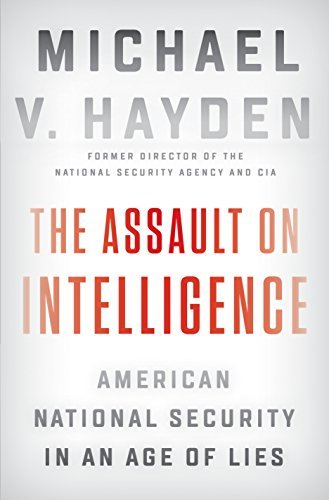
Mike Hayden is the former Director of the NSA and the CIA and a retired four-star US Air Force general. He is a Republican. Under normal circumstances, you’d expect such a man to support any Republican President. But these aren’t normal times. They haven’t been for the past three years or so. And one of the most unfortunate signs of just how unusual things are these days is that the President of the United States has declared war on the American intelligence community.
Estimated reading time: 5 minutes
Hayden’s new book, The Assault on Intelligence, is a powerful rebuttal to the belligerent and off-the-wall accusations that President Donald Trump has issued against the men and women of the CIA, NSA, FBI, and other agencies in the US government’s sprawling intelligence establishment. In a word, this book presents the case against Donald Trump from the intelligence community.
An utter lack of respect for the truth
Hayden is not unreservedly negative about the Trump Administration. He has good things to say from time to time that reflect his background in the military and the intelligence community. He is critical of some policies of the Obama White House. And he supports now-Secretary of State Mike Pompeo, Director of National Intelligence Dan Coats, and (with reservations) National Security Adviser H. R. McMaster. Like other intelligence professionals, he appears to be thrilled about the appointment of Gina Haspel as CIA Director.
However, he has nothing good to say about Donald Trump himself. Like so many of Trump’s critics on the Left, Hayden sees the President’s greatest sin as his utter lack of respect for the truth. As an intelligence professional who spent decades pursuing hard information to inform policy-making, he abhors the “post-truth” world the President has done so much to promote. And Hayden’s book is subtitled American National Security in an Age of Lies.
The Assault on Intelligence: American National Security in an Age of Lies by Michael V. Hayden (2018) 303 pages ★★★★☆
Trump’s tweets are “a gold mine for foreign services”
Hayden is concerned that Trump’s obsessive use of Twitter makes him vulnerable to pressure from other nations—not just Russia, but any country that seeks to gain advantage over the United States. “The president’s twitter tsunami must have been a gold mine for foreign services,” he points out. “Pressable buttons, loyalties, exposed nerves, responses to pressure, sleep habits, even his unfiltered id were pretty much on full display. And surely the contents of some tweets would tempt some foreign services to conclude that the president bluffs and bends the truth to meet the needs of the moment.
You can almost anticipate the language in the report: ‘Mr. Prime Minister, you need to know that President Trump appears to be what the Americans call a bullshitter.’ Good stuff for adversaries to know in upcoming sessions with POTUS and hardly designed to maximize the president’s leverage.” From an intelligence perspective, it’s hard to imagine a stronger case against Donald Trump.
There is no “deep state” in America
The Right-Wing obsession with the “deep state” is at the heart of the conflict between the Trump Administration and the intelligence community, in Hayden’s view. “I know what antidemocratic forces look like,” he writes. “I have seen them in multiple foreign countries. There is no ‘deep state’ in the American Republic. There is merely ‘the state,’ or, as I characterize it, career professionals doing their best within the rule of law.” The Assault on Intelligence is crammed with examples of honest men and women doing just that.
The case against Donald Trump
As you might imagine, Hayden is exceedingly well connected within the senior ranks of the intelligence community. He maintains personal relationships with many of the men and women he’s worked with in the past and with some who remain in the Trump Administration. Throughout The Assault on Intelligence, he quotes others to convey some of the most powerful sentiments about the President. For example, a “just-retired veteran case officer volunteered the harsh judgment that while he would have recruited someone like Donald Trump as an agent of influence . . . he would never have recruited someone like him as a source: you could never believe what he told you, he said, and if presented with a threat or an opportunity, he would have rolled on you and your network in an instant.”
There must be scores of Republican Congressmen who would render a similar judgment. If so, they’re not speaking up. But somewhere within the House Republican caucus there is a powerful case against Donald Trump that must someday come to light.
Two intertwining issues
In a final chapter, “Afterward,” Hayden steps back from the fray to analyze these deplorable circumstances from a strategic perspective. There are “really two issues,” he writes, “although they are intimately intertwined: the declining relevance of truth as traditionally understood (i.e., the evidence-based patterns developed during the Enlightenment), and Russia both exploiting and exacerbating that phenomenon.” The President disingenuously refuses to acknowledge either issue. That, in the end, is the case against Donald Trump.
For related reading
This book is just one of many others I’ve reviewed on the same topics:
- 5 top nonfiction books about national security
- 15 books about Donald Trump and his impact on American democracy.
Like to read books about politics and current affairs? Check out Top 10 nonfiction books about politics.
And you can always find my most popular reviews, and the most recent ones, on the Home Page.


























